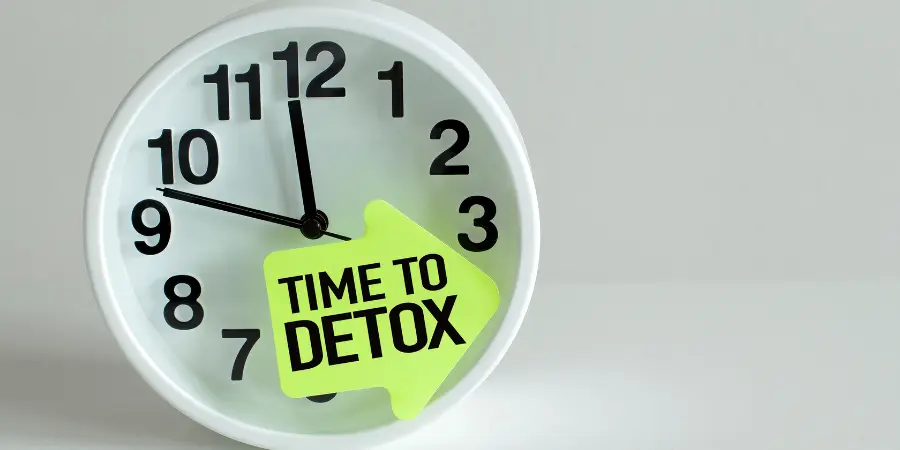
Written by:

Medically Reviewed by:
Last Updated:
August 13th, 2025
Prescription Drug Detox and Withdrawal | Timeline and Treatment
When prescription drug use gets to a point where stopping feels overwhelming, detox can offer a clear way forward. It’s the first step in breaking free from dependence and giving your body and mind the space to reset.
At Primrose Lodge, we provide a safe, structured environment to help you through it, whether you’re coming off opioids, benzodiazepines, stimulants or sleeping pills. With the right care in place, that first step becomes less daunting and a return to feeling like yourself becomes possible.
What prescription drug detox involves?
Detox is the process of allowing the body to clear out the drug while managing withdrawal symptoms. When a drug is used consistently, the brain and body adjust to its presence. If that drug is suddenly removed, withdrawal symptoms begin as the body tries to regain its natural balance.
- The severity and nature of these symptoms depend on several factors:
- The type of drug
- How long it’s been used
- Dosage
- Whether it was taken alongside other substances
Some people may experience mild restlessness and sleep issues, while others go through intense emotional or physical distress. That’s why a tailored detox plan, in a professional setting like Primrose Lodge, is so important.
What does ‘tapering’ mean?
Before we continue, it’s important to talk about some of the methods used in prescription drug detox. One of these methods is called ‘tapering’.
Tapering is the process of slowly reducing your dose instead of stopping all at once. For some prescription drugs, especially those like benzodiazepines or opioids, tapering is often the safest way to detox. It allows the body to adjust at a steady pace and helps ease the intensity of withdrawal.
At Primrose Lodge, we create personalised tapering plans based on your history and how your body responds. This approach gives you the best chance of getting through detox in a stable and supported way, without putting too much pressure on your system all at once.
Types of prescription drug detox
We provide detox programmes for a range of prescription medications. Each one is built around the unique withdrawal challenges posed by the specific drug.
Benzodiazepines
Commonly prescribed for anxiety and sleep problems, benzodiazepines like diazepam, lorazepam and alprazolam can be particularly difficult to stop due to their effect on the nervous system. Withdrawal may cause rebound anxiety, insomnia or even seizures if not managed carefully. At Primrose Lodge, we provide gradual tapering in a structured setting, helping reduce symptoms and keep you safe.
Opiates
Prescription opioids such as codeine, tramadol or oxycodone are powerful painkillers. They also carry a high risk of dependence. Detox often involves flu-like symptoms, cravings and muscle pain. Our opioid detox programme is designed to help ease these effects while preparing you for the next stage of recovery through supportive care and early therapeutic guidance.
Sleeping pills
Medications like zopiclone and zolpidem are typically used for short-term sleep problems but long-term use can cause reliance. Detox may include rebound insomnia, restlessness and mood changes. At Primrose Lodge, we support your body as it adjusts to natural sleep rhythms again, without the need for medication.
Stimulants
Prescription stimulants such as those used for ADHD or fatigue can affect mood, focus and energy levels. Stopping can lead to emotional crashes, low motivation and mental fog. Our stimulant detox programme focuses on restoring balance gradually, with rest, emotional support and therapeutic input to help manage the psychological shift.
The prescription drug withdrawal timeline
There’s no fixed timeline for withdrawal. It varies based on the drug type, how long it was used and your body’s unique response. However, most people experience withdrawal in stages. Here’s what that typically looks like, along with notes on how this might change depending on the substance.
Early withdrawal (6 to 24 hours after last dose)
Symptoms begin as the drug leaves your system. You may feel anxious, irritable, nauseous or restless. Some people also experience early sleep disruptions or cravings.
- Benzodiazepines: Symptoms may come on more slowly, sometimes taking one to three days to appear.
- Opioids and stimulants: Symptoms tend to begin within 6–12 hours and progress rapidly.
- Sleeping pills: Light symptoms like agitation or wakefulness can start within the first evening.
How Primrose Lodge supports you
We’ll monitor how your body reacts and introduce tapering strategies or comfort measures early on. You’ll be in a calm, monitored environment with access to support whenever you need it.
Peak withdrawal (2 to 5 days after last dose)
This is typically the most intense stage. Symptoms may include muscle aches, sweating, insomnia, low mood or panic. Appetite may fluctuate and cravings can feel overwhelming.
- Opioid detox: Physical symptoms like diarrhoea, chills and cramping are common during this period.
- Stimulant detox: You may feel emotionally flat, deeply tired or mentally foggy.
- Benzodiazepine detox: Symptoms may peak more gradually but can include heightened anxiety or sensory sensitivity.
- Sleeping pill detox: Rebound insomnia tends to reach its highest point here.
How Primrose Lodge supports you
You’ll have access to compassionate care, therapeutic activities to manage distress and medications (where appropriate) to ease specific symptoms. Our team will adjust your plan based on how you’re feeling and responding.
Stabilisation (after day 5)
Most physical symptoms begin to subside but emotional symptoms may linger. Fatigue, sleep disturbance or feelings of low motivation are common. This stage can last from a few days to several weeks depending on the drug.
- Benzodiazepines: Low-level anxiety or trouble concentrating may persist for longer.
- Stimulants: Mood and energy may take time to regulate, especially if use was heavy.
- Opioids and sleeping pills: Cravings may still appear unexpectedly, especially at night or in quiet moments.
How Primrose Lodge supports you
This is where your transition into therapy begins. We’ll provide one-to-one counselling, group support and holistic treatments like art or yoga to help restore balance and focus.
What detox feels like at Primrose Lodge?
Our aim isn’t to push you through detox, it’s to walk through it with you. From the moment you arrive, we build a plan that reflects your history, your health and your goals.
You’ll have:
- A private, quiet space to rest and recover
- Access to professional care
- A flexible plan that adapts as your symptoms change
- Gentle guidance into the next stage of treatment
Detox isn’t something you have to suffer through in silence. With the right support, it can be the first moment of real clarity.
When detox is worth considering
- If you’re struggling to cut down…
- If you’re feeling worse when the medication wears off…
- If you’ve tried to stop and found you couldn’t…
These are signs that detox could help.
You don’t need to have lost everything. You don’t need to be in crisis. Detox can be the first calm step back toward a life that isn’t dependent on medication to get through the day.
Let’s start this together
At Primrose Lodge, we understand that prescription drug detox can feel overwhelming but we also know how much better life can become when the cycle is broken.
Whether you’re coming off opioids, benzodiazepines, sleeping pills or stimulants, we’ll help you detox in a way that feels supportive and safe.
Reach out when you’re ready. We’ll take it from there.







